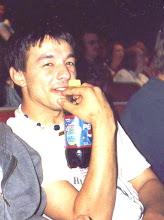: Riding with a Probation Officer: Officers blend law, social work (Utah)
KATIE ASHTON
Their firearms, Tasers, handcuffs and bullet-proof vests prove there is nothing easy about being a probation officer.
They blend law enforcement and social work to tackle issues -- and sometimes people -- to keep the community safe and probationers and parolees out of trouble.
"You'd be surprised what was in your neighborhood and what goes on," Randy Hall, a Utah County Adult Probation and Parole officer, said Wednesday night while driving on Interstate 15 on his way to stop by probationers' and parolees' homes with his partner, Julie Varoz.
Staking out a probation violator's Payson apartment, Tasers -- their best weapon -- strapped to their waists, Varoz and Hall drove by the building once to scope things out.
Are they home?
There are a lot cars in the parking; how many people could be in there?
What if she is spun out (slang for someone under the influence of drugs)?
To catch violators in "their natural state," Hall parks his car away from the residence and leaves it running, in case someone bolts. Varoz approaches the apartment first, standing off to the side of the door.
Banging and yelling for the probation violator to unlock the door and let her in, Varoz says if the woman is home she will immediately arrest her for violating her probation.
Placing the woman in handcuffs, Varoz stands guard while Hall checks the five-room apartment for other people.
Probation officers, or POs, do not arrest everyone who is using drugs "because there is not enough room in jail," Varoz said. "We can't lock them all up."
Instead, POs -- who are law-enforcement certified -- gauge how severe the situation is and determine whether violators are a risk to the community, Hall said.
POs draw on their social worker skills to find a balance between enforcing the law and helping their probationers and parolees find treatment, Varoz said.
In Wednesday's late night bust, the Payson woman violated her probation by testing positive for methamphetamine and missing an appointment with her PO.
Always in pairs, Hall left Varoz to watch the handcuffed woman as he searched the main bedroom for drugs and/or drug paraphernalia.
The woman's apartment, covered with scattered knic-knacs and piles of prescription bottles, clothes and papers, presented one major obstacle for Hall -- there were too many places to stash small amounts of drugs.
Solution -- K-9 backup.
The K-9, who is trained to search for drugs and other materials, scampered through the apartment, occasionally barking. Rapidly rummaging through every room, the 7-year-old dog sniffed around the apartment several times over and pointed out where drugs may be.
Hall was able to find trace evidence of cocaine on a broken piece of mirror, hidden underneath the bed, and meth crystals inside a plastic bag.
"Meth is a really big problem," in the county, Varoz said.
More than 90 percent of the crime in Utah County is associated with some sort of substance abuse, Hall said. Offenders, once sentenced to probation or released from jail or prison, must check in with AP&P and follow the rules the courts and Utah Board of Pardons lay out.
With a high number of probationers and parolees in Utah County -- more than 2,000 are assigned to AP&P agents -- being a PO is anything but a 9 to 5 job doing paperwork behind a desk.
Probation officers not only put their lives on the line almost daily -- potentially entering dangerous situations while visiting offenders -- but the career puts a strain on having a normal social life.
Working overtime every week, there are too many nights that leave Hall and Varoz clocking off work at 1 a.m. Even with categorizing each offender as a low, medium or high risk, each visit can turn serious in a split second.
"You could have a low that's totally out of control because they think they are flying under the radar," Hall said.
From criminal history to substance abuse and mental health to employment history, POs take dozens of things into consideration when classifying offenders. They take so much information into consideration to increase the effectiveness of AP&P services. POs work to help offenders become functioning members of society.
Besides having officers check up on probationers and parolees, AP&P offers free treatment services for those probationers and parolees who qualify. The Day Reporting Center, 150 E. Center St. in Provo, offers multiple classes, ranging from topics involving parenting to beating substance abuse.
During an AP&P open house Wednesday night, the center featured a presentation highlighting three success stories.
After completing her GED with the help of the center, Lisa Taylor said she is thankful for the staff that helped her find a positive path in life. Taylor will graduate May 19 as a certified nurse assistant.
"I hit rock bottom last September and ended up getting sent off to Utah State Prison," Tyler Patten, a center client said to a handful of people. "The more I stayed doing the right thing, the easier it gets."
The center's free programs are good because most offenders have fines and restitution to pay, said Martene Mackie, center supervisor.
But not every story ends with a happily-ever-after. Two-thirds of the people participating in the center's programs fail, Mackie said.
"Substance abuse is a rough road," she said. "We will not let anybody slide through. If they can't clean up, they're done."
Mackie said she is looking at revamping the center's programs to make them more individualized. For now, most of offenders are required to complete an 18-week course.
Katie Ashton can be reached at 344-2548 or kashton@heraldextra.com.
The Utah County AP&P region employs 63 people, with 36 probation officers and eight supervisors. Each probation officer balances between 60 and 70 cases at a time.
http://www.heraldextra.com/content/view/178580/3/


0 Comments:
Post a Comment
Subscribe to Post Comments [Atom]
<< Home